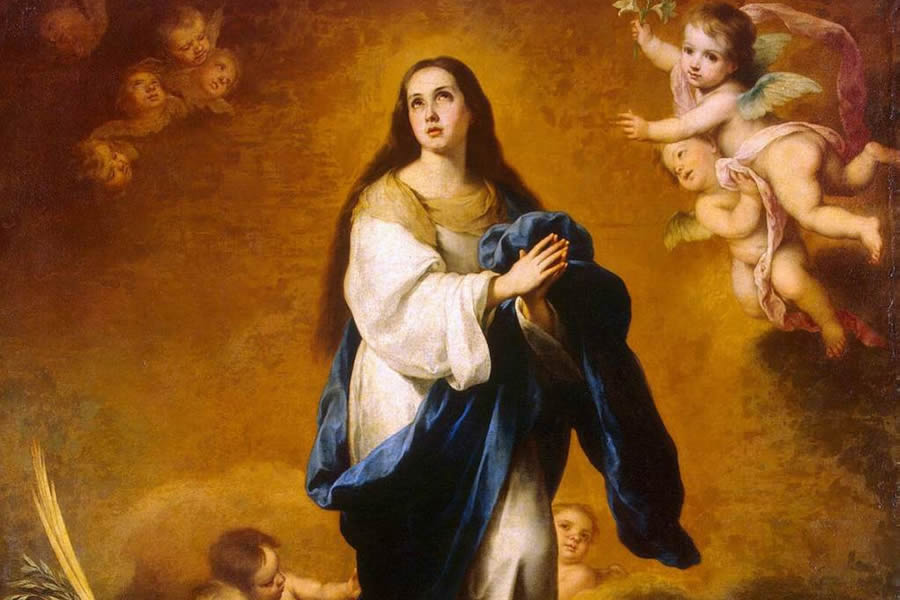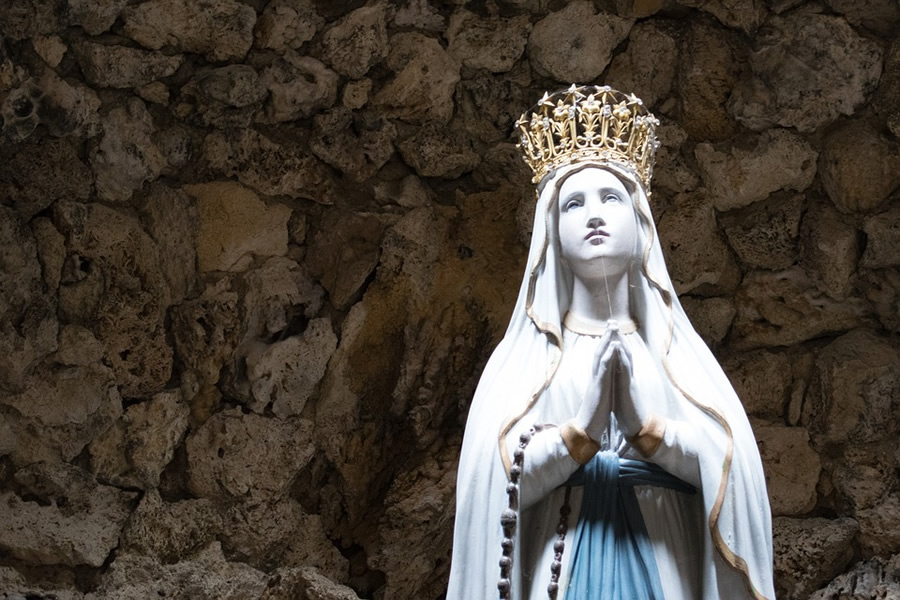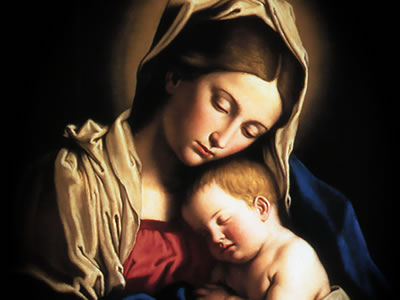Daily Prayer Versus Mass?
05/03/2020 | Why do we do that?Question: I have a friend who says she doesn’t need to attend Mass because she prays to God every day. What are your thoughts on this justification?
Answer: If the only reason for going to church were to talk to God, your friend might be right. Prayer is not something limited to a physical place or even a holy place. If the sole purpose of the Church were prayer, it would be a narrow purpose indeed. The Church is a community of believers, formed by “one Lord, one faith, one Baptism.” It is an outward sign of our faith in God instituted by Christ, and the purpose of the Church is to give us grace, that is, a share in God’s life.
ContinueWhere did the feast of Divine Mercy come from?
by © LPi | 04/19/2020 | Why do we do that?If you were born well before the year 2000, you know the feast of Divine Mercy has not always been celebrated in the Church. In the early 1900s, a young Polish nun began receiving private revelations. Jesus appeared to her during her times of prayer, speaking a message of mercy and love for the world. She received a set of prayers — the Divine Mercy Chaplet — and the request to have a feast day established to remind the Church of the mercy of God. St. Faustina died in 1938, on the cusp of war and in the midst of one of the most violent centuries in the history of the world. Her story and her diaries began circulating in Poland and beyond. It quickly became apparent that this was a holy young women, and the cause for her canonization opened. In the year 2000, she was canonized by the first-ever Polish pope, St. John Paul II. On her canonization day, he established the second Sunday of Easter as Divine Mercy Sunday, “a perennial invitation to the Christian world to face, with confidence in divine benevolence, the difficulties and trials that mankind with experience in the years to come.”
When Did the Church Begin to Honor Saints?
07/07/2019 | Why do we do that?Many people think that honoring saints was something the Church set up later, but it was part of Christianity from the very beginning. As a matter of fact, this practice came from a long-standing tradition in the Jewish faith of honoring prophets and holy people with shrines. The Church began to honor saints by AD 100. The first saints were martyrs, people who had given up their lives for the faith because of the persecution of Christians.
How Does the Church Choose Saints to Honor?
At first, saints were recognized by popular acclaim. This was very democratic, but it led to problems. Some people honored saints who were only legends or made up stories about saints. So, by the tenth century, the bishops and pope took over the authority for approving saints. The procedure the Church uses to name a saint is called canonization.
ContinueThe Saints: Which of These Statements Is True of Saints?
06/30/2019 | Why do we do that?- Saints are hermits who withdraw from the world.
- Saints never make mistakes or fail.
- Saints never get angry.
- Saints like to have fun and laugh.
Statement number one is FALSE.
Although many important saints were hermits, there were many who lived in the world. Saint Frances of Rome was a wife and the mother of three children. Though her husband adored her, her mother-in-law made fun of her in public. When war came to Rome, Frances’ small son was taken hostage and her home was destroyed. She turned this tragedy into triumph by converting her ruined home into a hospital and shelter for victims of war.
What's the Story on the Apparitions of Mary?
06/16/2019 | Why do we do that?Catholics have experienced Mary’s intercession in many ways. Generations of believers have praised Mary as one who has led them to the grace of God. Many trustworthy and holy individuals have reported visions of Mary, often accompanied by messages that have been the source of countless blessings. Shrines at the sites of such appearances are visited by millions of people every year, most notably at Our Lady of Guadalupe in Mexico, at Lourdes in France, and at Fatima in Portugal.
ContinueWhy Do Catholics Call Mary the Mother of God?
06/09/2019 | Why do we do that?The simple answer is: Because she is the Mother of Jesus, Mary is the Mother of God. As Vatican II puts it: “At the message of the angel, the Virgin Mary received the Word of God in her heart and in her body, and gave life to the world. Hence, she is acknowledged and honored as being truly the Mother of God and Mother of the Redeemer” (Dogmatic Constitution of the Church, #53).
This does not mean that Mary was the source of the divine nature of Jesus, but that she was the mother of his human nature and that there was no time when the human Jesus was not God. The second person of the Trinity existed for all eternity, but when the “Word became flesh,” Jesus was both human and divine from the first moment of his conception. Mary was Mother of Jesus Christ, both God and a human. Therefore, it is proper for us to call Mary the “Mother of God.”
ContinueWhy Do Catholics Call Mary "Ever Virgin"?
06/02/2019 | Why do we do that?With Scripture, we believe that Mary conceived the Son of God through the power of the Holy Spirit (Matthew 1:18; Luke 1:34-35). Catholic teaching and tradition like-wise speak of Mary remaining virginal after the birth of Jesus.
What about passages like Mark 6:3 that speak of Jesus' brothers? In the Catholic tradition, this has been interpreted not to mean other children of Mary, but rather close relatives. A tradition from the second century indicates Christians believed that these were Joseph's children from a previous marriage.
Continue
What do you mean by the Immaculate Conception?
05/26/2019 | Why do we do that?The dogma of the Immaculate Conception holds that Mary was free of original sin from the very moment of her conception. The inheritance of sin passed on from our first parents, Adam and Eve, did not taint Mary.
That seems like an unfair advantage. How could such a perfect person understand what we ordinary mortals are going through?
Continue
How Do Catholics Honor Mary?
05/19/2019 | Why do we do that?The way we honor important people in our lives is a lot like the way Catholics honor Mary.
As we show respect for our ancestors and other public figures by erecting buildings in their name and fashioning statues in their likeness, so we name churches and pictures of Mary our beloved mother.
In doing this we do not adore or worship Mary. God alone is the object of worship. Mary is a child of God, a creature, and a servant of God.
We consider Mary to be a powerful intercessor with God because of her closeness to God. We, therefore, invoke or call upon Mary to pray to God for us. Is it necessary to do this? No, for we believe that God is Emmanuel, meaning “God is with us,” that in Jesus especially we have access to God. We pray directly to God. By calling upon Mary, however, we share in her holiness and have someone praying for us who is very close to Jesus.
Continue
Why Do Catholics Honor Mary?
05/12/2019 | Why do we do that?Mother’s Day is a day set apart for us to think of those extraordinary women or individuals who have affected us by playing the role mother in our lives. One woman in particular who has affected us all is the one whom scripture described as, “Blessed are you among women, and blessed is the fruit of your womb” (Luke 1:42). Catholics throughout the ages have treasured the truth of these words of Elizabeth to Mary. At the center of Catholic faith is Jesus Christ, who is the blessed fruit of the womb of Mary. Close to Jesus, and inseparable from him, is Mary, his mother.
Elizabeth calls her Mother of the Lord (Luke 1:43). God’s beautiful plan of redemption called upon the faith, hope, and love of Mary. She said yes: “Let it be done to me according to your word” (Luke 1:38). Because she said yes, Christ was born and we were redeemed.
So, it makes sense that those who confess Jesus as their Lord and Savior will also show honor and respect to his mother, Mary.
Continue